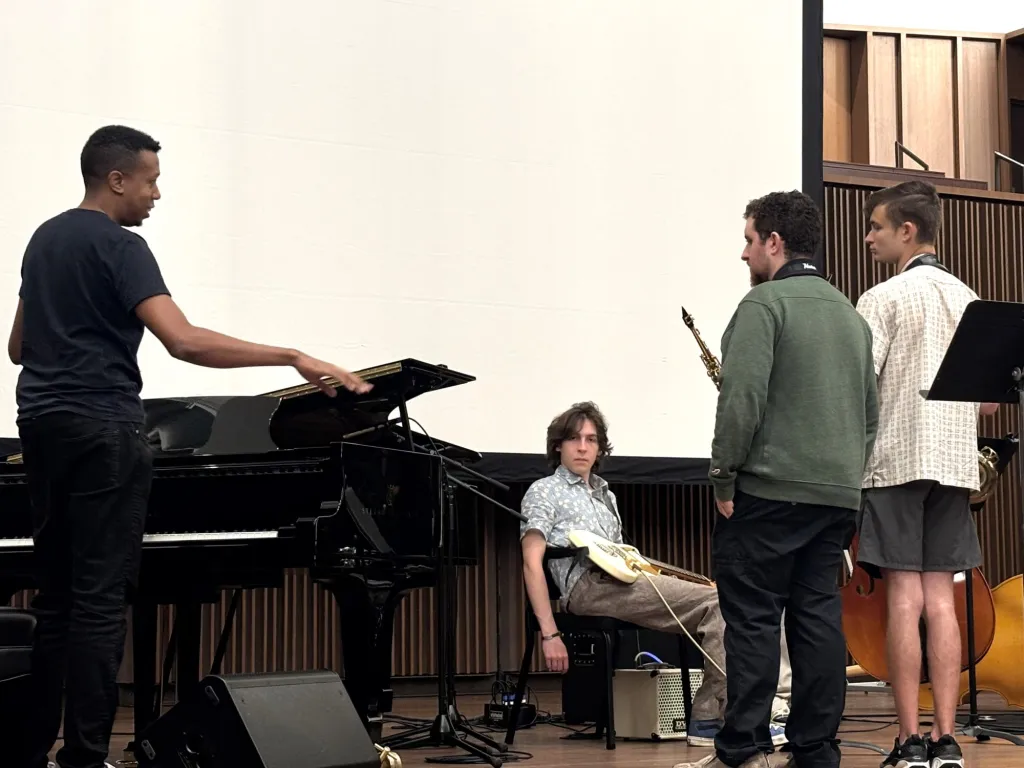
When JazzReach’s Metta Quintet ended its recent campus visit with a masterclass for William & Mary’s jazz band, students received mentorship from some of the best musicians of our time.
Wisdom flowed: Look and listen while you play. Phrase solos with intention. Vary volume and tempo to reflect emotion. Breathe!
But the most important lesson went unspoken, conveyed in the way the artists approach their craft and the collective sound they inspire.
Jazz, America’s classical music, is democracy’s soundtrack — one and many at work, bouncing, swinging and, at times, teetering together.
As with democracy, jazz’s magic is messy and unpredictable. The music zigs and zags with an alacrity of the moment. Often, it sounds better than it looks.
A few minutes into the class, Metta’s tenor saxophonist Troy Roberts waves his hand, and the music stops. The students are working hard to bring to life Charlie Parker’s classic blues, “Now’s the Time.”
Roberts moves musicians around. “You’re right next to each other, bass and drums, but you’re not seeing each other. You got to lock in! Let’s go again from the top.”
No matter how rough the attempt, there’s always a chance to take it again from the top. Each performance is a draft, leaving unfinished business, something to aim for next go-round.
I hear our nation in the students and their mentors, in the nurturing of confidence that transforms tone into voice, in the give-and-take.
“Let’s do it again, and this time listen to everyone around you.”
Shared aspirations drive the experimentation and sustain the players when the notes aren’t right, when the rhythm doesn’t click, when they fall short of the melodies they hear in their heads.
The students’ striving to swing suggests a way out of our fractured, discordant moment in American society.
They all stop again. This time it’s Metta’s alto saxophonist Christopher McBride. “Someone’s playing a minor key in bar nine. Can’t be in minor when the rest of the band is in major. Doesn’t work.”
Words to live by.
They start up once more, now listening so intently to one another, we all lean in.
The students reach for unity through musical banter and exclamation, urged on by an eyebrow-bending dare from Roberts, then McBride.
I can’t help but wonder, what if our democracy sounded more like these college students?
At root, democracy and jazz share a devotion to include, empower and connect all participants.
Both recognize the dignity of individuals and coming together to achieve a greater good.
Whether bound by a constitution or an agreed-upon set of chord changes, democracy and jazz are equally committed to a framework, a shape within which improvisation can and must happen.
The music stops again. It’s Metta’s pianist Lawrence Fields asking, “What is the blues?”
There’s a long beat. Is he being rhetorical? Or asking a philosophical question?
Neither. Fields offers a brief, humbling history lesson. “You’ve got to know where this music comes from to feel it, to play it,” he says. “It has shape and emotion; both are connected to its roots.”
Once again, from the top, the students wrestle with the tune’s blues structure, listening, adjusting, trying to find and express themselves within the group’s overall sound and direction.
My thoughts return to our country — our time — our attempt to start, once again, from the top, to search for shared values that give our society shape, a set of common chords, a language to express our best selves in public.
Jazz demands that we look outward, at others and in the eye, but with introspection, an openness to our inner voice, distinct and authentic.
What might our democracy sound like if we were to follow the students’ earnest embrace of Metta’s playbook: know your history, find your voice, listen to those around you, and always — always — reach to swing together.
Let’s go again from the top. Now’s the time.
Ted Maris-Wolf is a historian, author and Williamsburg resident.